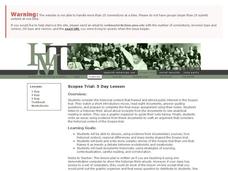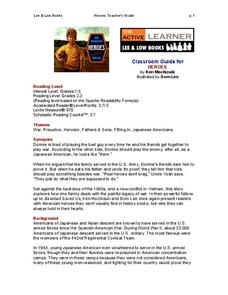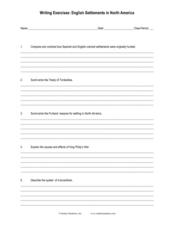Curated OER
U.S. Expansion and the Age of Empire
For this American foreign policy worksheet, students respond to 2 essay questions about expansionism in the country during the 20th century.
Curated OER
An Untold Triumph
Middle schoolers examine and analyze the history and experience of Filipinos in Hawaii and California. They identify the contributions of Filipino Americans to the US war effort in World War II, and analyze the many causes that led to...
Curated OER
Imperialism
In this U.S. history worksheet, students read assigned textbook pages regarding Imperialism and respond to 45 short answer questions.
Curated OER
Yellow Journalism in the Spanish-American War
Learners write a newspaper based on events in the year 1898 using Yellow Journalism, the exaggeration of facts or events.
Core Knowledge Foundation
Volume 2 - A History of the United States: Modern Times—Late 1800s to the 2000s
The second volume of the Core Knowledge History of the United States ebook begins by asking young scholars to consider the impact immigration, industrialization, and urbanization had on the United States in the late 1800s. The text ends...
PBS
President Theodore Roosevelt: Foreign Policy Statesman or Bully?
Can a negative perception of a president's foreign policy harm his or her historical legacy? A project that winds the clock back to the date of Theodore Roosevelt's death puts students at the editorial desk of a fictional newspaper....
Curated OER
Reconstruction of Iraq: A Lesson of Historical Precedents
Students view a video clip about the reconstruction efforts in Iraq. They work together to compare and contrast the reconstruction plans after the Spanish-American War and World War II. They compare those results to the situation in Iraq.
Curated OER
Whose Side Are You On?
Students role play, persuading and staying neutral during arguments. In this viewpoint lesson, students examine the viewpoints of soldiers in the Spanish-American War and role play. After a discussion, some students try to persuade the...
Little Kids Rock
The Influence of Latin Music in Postwar New York City
Music has often been called the international language that transcends cultures and regions. Scholars analyze the impact of Latin American music on New York City culture in the years following World War II. They research music, video,...
Curated OER
Events Leading to the War of 1812
For this US History worksheet, students read a selection of the War of 1812 and fill in the blanks for 10 sentences using a word bank.
Curated OER
Famous African Americans,
Studying African American history? Explore and discuss famous African Americans such as Martin Luther King Jr., George Washington Carver, Harriet Tubman, and more. Simple bulleted facts detail the heroic deeds of these individuals. Use...
Curated OER
An English-Speaking World
An overview of the development of English as a global language fills out these slides. Beginning with statistics regarding how much of the world speaks English and to what capacity, a brief history is then given mostly pertaining to WWII...
College Board
2016 AP® United States History Free-Response Questions
The British and Spanish both had footholds in the New World, yet they had different approaches. Scholars explore the dynamics, along with the reasons behind immigration to the United States and business practices of the Gilded Age in a...
K20 LEARN
Deconstructing Reconstruction: The Reconstruction Era
High schoolers examine the Reconstruction programs instituted following the American Civil War, the potential for change these efforts offered, and the realities that occurred. Guided by a PowerPoint presentation, class members read a...
Historical Thinking Matters
Scopes Trial: 5 Day Lesson
Did Scopes violate the Butler Act? Why did so many Americans follow the Scopes trial? See analytical reading in action with a fantastic five-day lesson plan in which class members consider the historical context that provoked public...
Curated OER
Heroes
Students explore reading comprehension strategies. In this character development and reading comprehension activity, students brainstorm common traits of "heroes." Students read Heroes, then identify the personal conflicts the story...
Curated OER
Is the Media Part of the Story?
Students discuss the role of the media in public opinion. They use the internet to research when the media has had an impact on war. They write an essay about their research and any conclusions they have made.
Curated OER
Lines From Behind the Lines
Fifth graders create a timeline of events in a soldiers life. In this World War I lesson, 5th graders learn about the Great Depression and World War I. Students watch video segments about World War I and examine primary...
Curated OER
Parallel Studies of the Afro-American and Puerto Rican Experience in America
Students compare/contrast the Afro-American and Puerto Rican experience as they migrated and assimilated in the U.S. They research and discuss the reasons for migration and the historical significance of economic autonomy and oppression.
Curated OER
Charles Young Photographs
Young scholars view photographs of Charles Young. They analyze the photograph to decipher the time period. As an introduction, students brainstorm questions they may ask the man in the photograph. Young scholars investigate the era of...
Curated OER
Happy Endings: The Final Battle
Fifth graders explore all the myths of the battle of Yorktown. A variety of primary documents are viewed and analyzed for discussion. They become aware that what one sees and hears is not always as it seems in reality. Each group...
Curated OER
The Birth of the American Empire as Seen Through Political Cartoons (1896-1905)
High schoolers explore the concept of political cartoons. In this political cartoons lesson, students examine political cartoons from different time periods in American history and respond to questions regarding them.
Curated OER
Writing Exercises: English Settlements in North America
A great writing exercise should have it all. This one requires learners to think critically about cause and effect, compare and contrast, and summarizing. They compose responses to five short answer questions regarding Spanish and...
Curated OER
The Restoration Colonies
Explore the earliest American cities in this presentation, which details the demographics, geography, and characteristics of New York, Pennsylvania, and the Carolinas, among others. These slides help to fill in the gap between the...

























